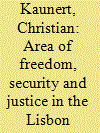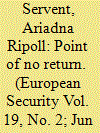| Srl | Item |
| 1 |
ID:
101138


|
|
|
|
|
| Publication |
2010.
|
| Summary/Abstract |
Scholars may rightly claim the European Union's (EU) area of freedom, security and justice (AFSJ) has become one of the most significant developments in the European integration process. The Lisbon Treaty (LT) has the potential to push the AFSJ towards tremendous growth, and has provided the policy area with instruments that were unthinkable after the third pillar was created during the Maastricht Treaty negotiations. This article investigates the role of the European Commission in the process of constructing an 'AFSJ'. It argues that the Commission (through alliances with other institutional actors) managed to incrementally contribute to this shift in political norms. This shift derived from the policy-making level from 1999 onwards. It manifested itself specifically during the negotiations of the Constitutional Treaty (CT) and the subsequent re-negotiation of the LT. Here, the Commission acted with the support and the use of other supranational actors during the Convention, without which this result would have been difficult, if not impossible, to obtain. Firstly, the article will deal with the main advances of the CT which resulted in the LT. Subsequently, the role of the Commission and other EU institutional actors will be examined, resulting in an overall evaluation.
|
|
|
|
|
|
|
|
|
|
|
|
|
|
|
|
| 2 |
ID:
187082


|
|
|
|
|
| Summary/Abstract |
In this article, we explore the security politics of EU database interoperability, inquiring how knowledge infrastructures underpin European security integration. Sitting at the intersection of Science and Technology Studies (STS) and critical approaches to European security, we unpack the co-constitutive relation between database anxieties and interoperability mechanisms. By database anxieties, we refer to what European institutions identify as the main epistemic and operational concerns that emerge from the current use of databases by security authorities across Europe. These anxieties are expected to be resolved by mechanisms that foster interoperability. We argue that the relation between database anxieties and interoperability mechanisms shapes the novel conditions of possibility for European security integration in a datafied world. While far-reaching in technological terms, interoperability is not about introducing a new overarching system, but about the management, re-organisation and re-purposing of datasets. Such formatting matters politically because it eventually informs sovereign acts of policing and mobility control.
|
|
|
|
|
|
|
|
|
|
|
|
|
|
|
|
| 3 |
ID:
101139


|
|
|
|
|
| Publication |
2010.
|
| Summary/Abstract |
The entry into force of the Treaty of Lisbon has raised new expectations in the area of freedom, security and justice (AFSJ). The extension of co-decision increases the capacity of the European Parliament (EP) to have an influence on decision-making. This article engages with securitisation theories in order to analyse the evolution of the AFSJ as well as the role of its main actors in the securitisation process. It evaluates the past role of the EP as well as the recent changes introduced by the extension of co-decision in order to establish whether it will become a new securitising actor or will have the potential for de-securitisation of the agenda. The macro-institutional changes in the Treaty of Lisbon indicate that the EP will have opportunities to de-securitise, although the emphasis on EU citizens' rights introduced in the Stockholm programme offers it a chance to appeal to domestic audiences at the expense of more diffuse issues such as immigration and asylum.
|
|
|
|
|
|
|
|
|
|
|
|
|
|
|
|